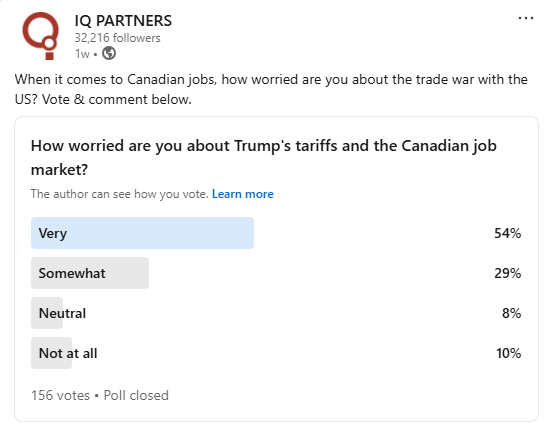The tariff war is in full swing, and many countries and industries are feeling the effects. In our years working in executive search in Toronto, we’ve never seen something with so much uncertainty as Trump’s tariffs. They are on, they are off, then paused, and then on again. They go up and then down. They apply to all countries and industries and are then repealed.
It’s been a roller coaster ride for companies, and it’s caused most to pause because there have been so many unknowns. And, perhaps the biggest challenge is that no one knows what will happen next. Everything could change tomorrow. Trump’s tariffs have already started to affect the Canadian job market, and they could have future implications.
In this blog, we’ll talk about how tariffs will affect the job market. We’ll answer these questions:
- How worried are you about Trump’s tariffs and the Canadian job market?
- What industries most impact the tariff war between Canada and the United States?
- How could Trump’s tariffs impact the Canadian job market?
POLL – How worried are you about Trump’s tariffs and the Canadian job market?
Tariffs are top of mind for most people. So, we polled LinkedIn to see how people are currently feeling about tariffs and the potential impact on jobs. Our poll found that the vast majority of people feel very or somewhat worried about the job market amid this trade war. More than half (54%) are very worried, while only 10% are not at all worried.
Here are the poll results:
What industries most impact the tariff war between Canada and the United States?
Many industries are affected by tariffs, and there are just as many related industries that could feel the brunt of the trade war. Here are the top industries that are being affected the most by Trump’s tariffs:
1. Automotive Industry
Tariffs have been on and off. While not always implemented, the threat of tariffs on Canadian auto exports (a key part of Canada’s economy) created significant uncertainty. The auto sector is highly integrated across the border, with parts and vehicles crossing multiple times during production. Some companies have already announced temporary production pauses and layoffs.
2. Steel and Aluminum
The U.S. imposed tariffs on Canadian steel (25%) and aluminum (10%), citing national security concerns. Canada is a top exporter of both steel and aluminum to the U.S., so this hit Canadian producers hard. It also raised costs for U.S. manufacturers relying on these imports. Steel and aluminum tariffs have the most impact on Quebec.
3. Forestry and Lumber
Although technically part of a longer-standing dispute, softwood lumber has been a recurring point of contention, with the U.S. imposing duties on Canadian imports. Lumber tariffs affect the construction and housing industries in both countries.
4. Oil and Gas
The U.S. is one of the largest purchasers of Canadian crude oil. However, imposing tariffs on these imports would make Canadian oil less appealing to U.S. refineries, which may then seek alternative sources not subject to the same financial burdens.
As a result, Canada’s oil-producing regions—especially Alberta—could see a decline in production. This downturn might trigger significant job losses, not only in the oil sector itself but also in supporting industries such as transportation and equipment manufacturing.
5. Agriculture and Food Products
Canada imposed tariffs on a variety of U.S. agricultural goods, including potash, maple syrup, orange juice, Whisky (e.g., Kentucky bourbon), and many other agricultural products. U.S. farmers and food producers experienced reduced exports and increased competition from domestic and other international suppliers. This could also lead to a surplus of products in Canada, which would drive down prices and financially impact Canadian farmers.
6. Consumer Goods
Tariffs also extended to many household items and consumer goods like electronics, shoes, clothing, furniture, and more. These measures were designed to put pressure on specific U.S. constituencies and manufacturers. Expect to see a price increase for many of these items.
How could Trump’s tariffs impact the Canadian job market?
There are a lot of ways tariffs could impact the job market. But what industries and to what degree is still up in the air. There is no question that businesses are facing uncertainty and pressure to act as things fluctuate. Here are some things we could see in the job market in 2025:
- Hiring freeze: Many companies could put a temporary hiring freeze on until things stabilize.
- Layoffs and temporary shutdowns: Companies in the auto sector have already started to announce temporary measures such as layoffs and shutdowns.
- Change in operations: Expect to see some changes in operations. This could come in the form of reduced hours or the halt of production of certain products.
- People leave affected industries: The tariff war is creating financial stress for employees. Some may look for work in more stable industries.
- Recruitment challenges: Companies in affected industries could have recruitment and retention challenges. Impacts can include decreased employee morale, loss of talent and reputational damage, which can weaken the organization’s capabilities and competitiveness.
- Permanent decline: Some industries, or local economies, could see a permanent decline in operations, leading to fewer jobs and employment opportunities.
- Innovation: Companies could be forced to find new markets and new ways to operate. This could help secure their business presence or even create a need to hire.
A final word on tariffs and the Canadian job market
Undoubtedly, certain sectors of the Canadian economy will face challenges. The key questions are: to what extent, and for how long? Despite this uncertainty, demand for talent remains strong. Many organizations are grappling with talent shortages and the complexities of upcoming retirements and succession planning.
More About The Canadian Job Market
How The Latest Economic Uncertainty May Impact Your Job Search






